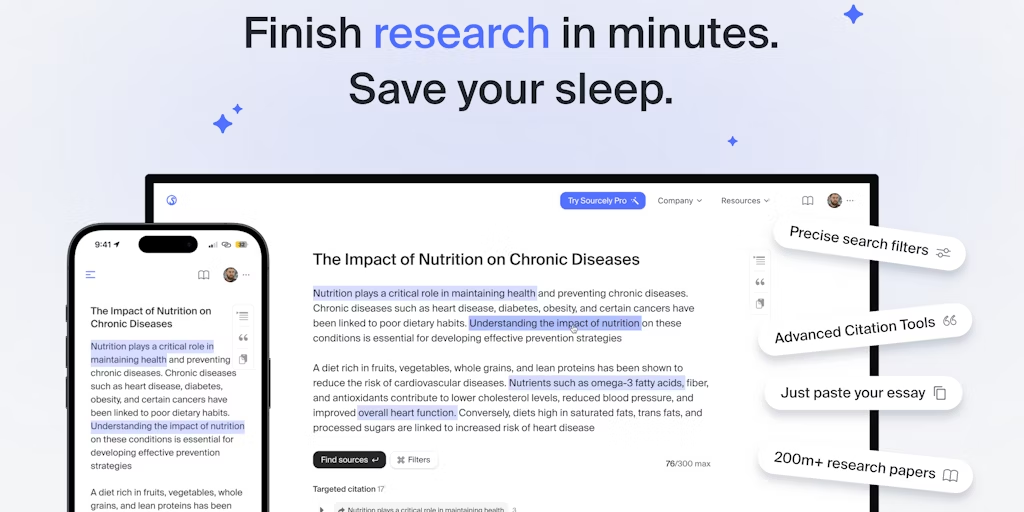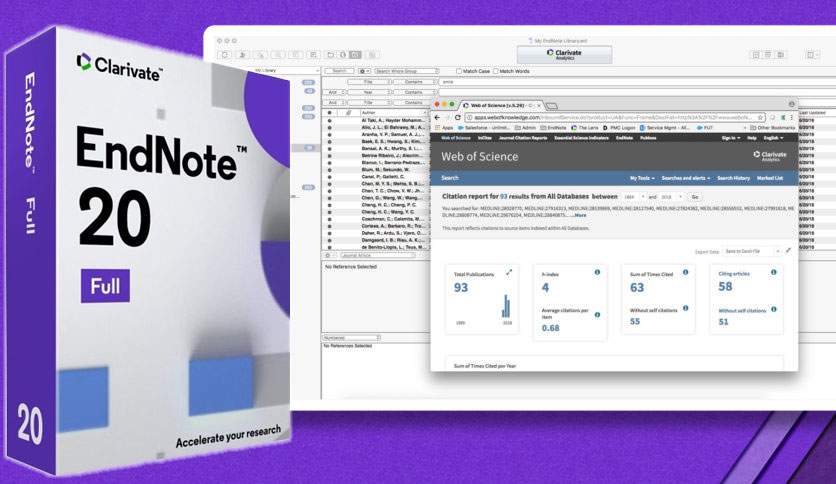Tool
Overview
Pros
Cons
Best For
Sourcely
AI tool designed for finding credible academic sources using natural language processing.
- Reliable academic sources
- Some advanced features are behind a paywall
- Best for academic topics, not general subjects
Zotero
Reference management tool with AI-powered search tools.
- Great for managing citations
- Limited AI features compared to other tools
- Researchers who need to organize and manage a lot of references
EndNote
Comprehensive reference management tool with advanced citation features.
- Advanced citation and bibliography tools
- Expensive if you want all the features
- Academics and professionals who need detailed reference management
ChatGPT (OpenAI)
Versatile AI tool that can be used as a research assistant.
- Versatile and provides quick explanations
- Not a source of peer-reviewed information
- Getting quick clarifications, brainstorming ideas, and understanding complex topics better
1. Sourcely
 Overview: Sourcely is an AI-powered research tool that helps students find credible sources for their essays and research papers. It uses natural language processing to understand your topic and show you the most relevant articles. The tool is designed specifically to support academic research, offering peer-reviewed sources that are trustworthy and academically credible.
Pros:
Overview: Sourcely is an AI-powered research tool that helps students find credible sources for their essays and research papers. It uses natural language processing to understand your topic and show you the most relevant articles. The tool is designed specifically to support academic research, offering peer-reviewed sources that are trustworthy and academically credible.
Pros:
Cons:
Best For: Students and researchers who need reliable academic sources and want a simple, effective interface that ensures high-quality information is easily accessible.
2. Zotero
 Overview: Zotero is a well-known reference management tool that also has some AI features to help you find and organize research documents. Zotero makes saving, citing, and sharing research much easier by automatically capturing citation information directly from your browser. It can also sync across multiple devices, so you have access to your research wherever you are.
Pros:
Overview: Zotero is a well-known reference management tool that also has some AI features to help you find and organize research documents. Zotero makes saving, citing, and sharing research much easier by automatically capturing citation information directly from your browser. It can also sync across multiple devices, so you have access to your research wherever you are.
Pros:
Cons:
Best For: Researchers who need to organize and manage a lot of references, especially those working on long-term or multi-stage projects where keeping everything organized is key.
3. EndNote
 Overview: EndNote is a reference management tool that also uses AI to help make research more efficient. It's known for its strong citation and bibliography features, as well as AI-powered search tools that help users locate related references across numerous databases. EndNote allows you to import PDFs and take detailed notes, making it a comprehensive choice for in-depth research projects.
Pros:
Overview: EndNote is a reference management tool that also uses AI to help make research more efficient. It's known for its strong citation and bibliography features, as well as AI-powered search tools that help users locate related references across numerous databases. EndNote allows you to import PDFs and take detailed notes, making it a comprehensive choice for in-depth research projects.
Pros:
Cons:
Best For: Academics and professionals who need detailed reference management and integration with a wide range of academic databases. It's particularly useful for researchers who need to collaborate with colleagues.
4. ChatGPT (OpenAI)
 Overview: ChatGPT can be used as a research assistant to generate summaries, explain concepts, and answer questions about your research topic. Even though it’s not a traditional research tool, it’s a great addition for helping researchers brainstorm and get quick insights. ChatGPT can help generate ideas, provide background information, or suggest different angles to explore on a topic.
Pros:
Overview: ChatGPT can be used as a research assistant to generate summaries, explain concepts, and answer questions about your research topic. Even though it’s not a traditional research tool, it’s a great addition for helping researchers brainstorm and get quick insights. ChatGPT can help generate ideas, provide background information, or suggest different angles to explore on a topic.
Pros:
Cons:
Best For: Getting quick clarifications, brainstorming ideas, and understanding complex topics better. It's especially helpful when you're at the early stages of research and need inspiration or basic information.
Which Tool Should You Choose?
The best AI-powered research tool for you depends on what you need:
Final Thoughts
AI-powered research tools can really help anyone involved in academic or professional research. Whether you need help finding sources, managing your references, or brainstorming new ideas, there is an AI tool that can meet your needs. Think about which features are most important to you—like reliable sources, ease of use, or help with citations—and pick the tool that matches your needs best.
Remember, combining tools can also be highly effective. For example, using ChatGPT to brainstorm and generate initial ideas, Sourcely to find credible sources, and Zotero or EndNote to manage your citations can give you a comprehensive and powerful research toolkit. By using these powerful AI tools, you can make your research faster, more efficient, and even more enjoyable. Try these tools out today to see which one works best for your research workflow.
Top AI-Powered Research Tools Compared
